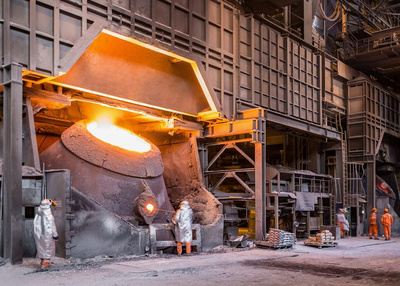Steel summit for a modern and future-proof steel industry in Saxony
by Hans Diederichs

At the Saxon Steel Summit, Economics Minister Martin Dulig reiterated the industry's support of the Free State of Saxony in climate protection, energy, foreign trade and research policy challenges. The participants agreed on a position paper for a modern and future-proof steel industry in Saxony.
"With around 1,700 employees, the steelworks are an important employer offering attractive prospects, especially in rural areas. With them and their employees, we contribute Saxony to high-quality and innovative steel production in Germany and thus create the basis for equally high-quality and innovative products in numerous user industries in Saxony, Germany and the world," said Economics Minister Martin Dulig.
Domestic steel is an important prerequisite for the strong user industries in Germany and Saxony, above all the automotive industry, the construction industry and mechanical and plant engineering, to be able to manufacture high-quality and innovative products and thus assert themselves in global competition. Therefore, the Free State of Saxony has a correspondingly high interest in a strong and competitive steel industry in Saxony. The industry is already struggling with difficult economic conditions and worldwide overcapacities, above all due to exports from China. From the point of view of the Saxon state government, the industry must not be burdened additionally, especially by energy and climate policy and the planned end of coal-fired power generation.
Economics Minister Dulig: "The Free State of Bavaria will continue its efforts in the future to ensure that the competitiveness of local electric steel production remains guaranteed. The security of supply must not be jeopardised, nor must further increases in electricity costs or additional CO2 requirements place further burdens on it. We are therefore committed to extending the ERDF co-financed support for investments in measures to increase energy efficiency from the new funding period 2021 also to large companies, e.g. in the Saxon steel industry."
The steel industry in Saxony and East Germany has already made a major contribution to reducing greenhouse gas emissions in recent decades. In addition, the use of scrap as a raw material and the process of producing electric steel itself already leads to a significant reduction in CO2 emissions compared with conventional steel production. The competitiveness of electric steel production must therefore not be jeopardized by any restrictions on supply security, further increases in electricity costs or additional CO2 requirements. As part of the negotiations to reorganise the EU emissions trading system from 2021, Saxony supports the call for EU emissions trading to be structured in such a way as to ensure sustainable climate protection - without endangering the steel industry in Germany and Europe and the millions of industrial jobs associated with it.
Saxony's Economics Minister Martin Dulig said: "The targets currently being discussed are unrealistic and both technically and economically unattainable. They would burden the steel industry in Germany alone by 4 billion euros between 2021 and 2030. This would put 8,200 jobs at risk in eastern Germany alone!
The money should flow better into investments for more efficient and environmentally friendly plants instead of into certificates. Innovations are an important guarantee for the future competitiveness of the steel industry. Here the Saxon steel industry is characterised by its ability and power to innovate. And the Saxon scientific landscape offers a wide range of competences in both research and teaching, which also benefit the local steel industry. Energy research in particular is one of the strengths of Saxony's universities and research institutions.
Dulig continues: "With the Master Plan Energy Research in Saxony and our technology-open research funding, we support companies in their research and development work in order to become even more modern and efficient and to make their business models fit for the future".
Source: Sächsisches Staatsministerium für Wirtschaft, Arbeit und Verkehr Photo: Fotolia

